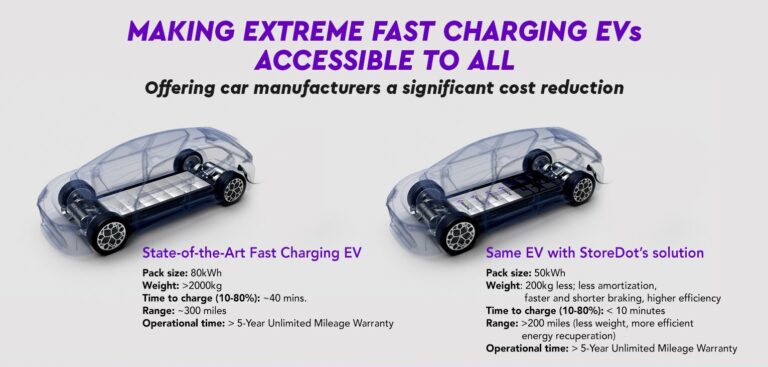Developer of extreme fast charging (XFC) battery technology StoreDot has announced that it will soon be manufacturing silicon batteries that enable auto makers to design and produce lighter, more sustainable and more cost-effective electric vehicles.
StoreDot’s XFC technology is stated to have reached sufficient charging and discharging cycles to enable vehicle manufacturers to include a smaller battery pack. Through the installation of a smaller battery pack with XFC, EVs can benefit from improved efficiency, an increased use of regenerative braking, a reduced carbon footprint and a lower overall cost.
The company says it is on track to deliver its 100in5 silicon-dominant extreme fast-charging batteries to EV OEMs by 2024. StoreDot’s tech delivers 160km of range in five minutes of charge, helping to relieve range anxiety and enabling OEMs to re-evaluate EV specifications. By using a 50kWh instead of an 80kWh battery pack, an estimated 200kg of weight could be saved, in addition to reducing the vehicle’s build cost by up to US$4,500.
The use of the battery technology will also lower the required number of raw materials for each vehicle, helping to reduce an EV’s carbon footprint throughout its service life. Furthermore, the use of XFC in smaller packs results in efficient regenerative braking as it can accommodate the corresponding recuperated high currents.
“Up until recently OEMs were increasing the size of battery packs in their EVs because a proportion of drivers were transitioning from gas to electric for the first time with the known ‘range anxiety’ in their minds,” explained Dr Doron Myersdorf, CEO, StoreDot. “Those drivers, and anyone who is an EV advocate, now realize that range anxiety is no longer the most pressing issue – and won’t even be an issue at all once public charging infrastructure around the world is properly in place.
“The two remaining barriers to EV ownership are charging anxiety and cost, and StoreDot’s XFC solution was designed to assist with both. Radically reduced charging times will allow automotive manufacturers to rethink how they approach battery size and range. When charging times are no longer an issue, it makes a lot more sense to fit smaller battery packs. The cost savings could transform the accessibility of EVs and sustainability of batteries, with better car efficiency, fewer raw materials needed and less recycling at the end of their in-vehicle life.”


